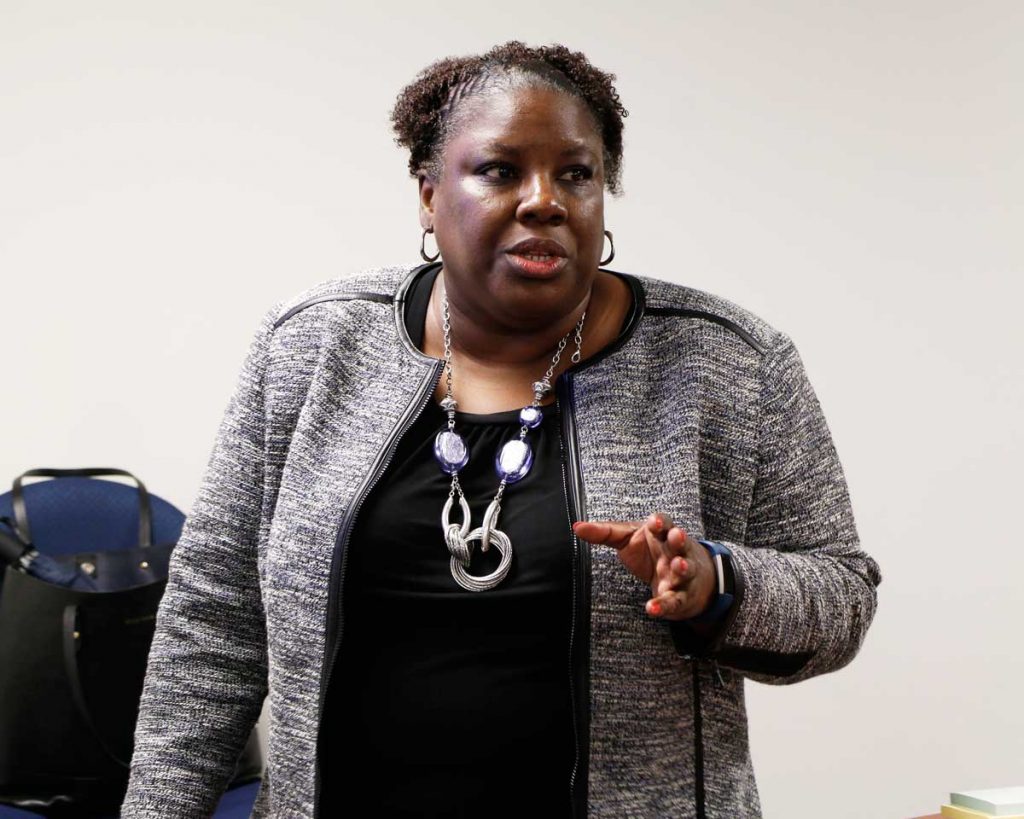
Katrina Caldwell speaks to students concerning connectedness and diversity on Tuesday night. Photo By Xinyi Song
“Often people’s resistance comes from not knowing,” Katrina Caldwell said to a group of 50 students in the library Wednesday night. “We have to change attitudes, change the narrative. We have to find the ways our values connect.”
Caldwell, vice chancellor for diversity and community engagement, spoke about connectedness and diversity. Her lecture was part of the “Are You Ready? Dialogue Series,” which aims to start conversations between students and faculty about difficult and important topics.
Hosted by the library, this week’s topic was “Just Mercy,” the university’s Common Reading Experience booker 2017, that is required for many First-Year Experience classes.
“Just Mercy” recounts the chilling story of Walter McMillian, a young black man who was wrongfully sentenced to death for the murder of a white woman with whom he was involved.
Bryan Stevenson, author of “Just Mercy,” founded and now runs the Equal Justice Initiative, an organization which, among many other things, seeks to exonerate wrongfully imprisoned people, and also to aid those who are mistreated while incarcerated.
“It’s a calling for justice. I think that Bryan is an important representation of having a strong narrative of who you are as a person, and more importantly what you can contribute to the world.” Caldwell said. “I think just from his story, it’s clear that each of us has the capacity to make changes in the world.”
Caldwell said she works to increase opportunities for all students and advocates four primary ways to affect change. She said those ways were to get close to the issue at hand, get uncomfortable, stay hopeful and finally change the narrative.
“First, you’ve got to get close to the issue, get proximate,” Caldwell said. “To create sustainable change, you have to get uncomfortable. Try something different.”
At the lecture Earnest Stephens, project coordinator for the NASA Mississippi Space Grant Consortium and First-Year Experience professor, echoed Caldwell’s sentiments.
“Being a change agent is never comfortable,” he said.
In this discussion-based lecture, Caldwell invited students and faculty to share issues they feel are affecting Ole Miss.
Kelle Thigpen, junior pharmaceutical sciences major, cited a lack of representation in public spaces as one problem.
“When I go to the Grove, I see so much of one type of person,” she said. “It’s not an intentional discrimination, there’s nothing stopping you from going there, but when you don’t see yourself represented you’re less likely to try to engage in that.”
Maliah Wilkinson, sophomore communication sciences and disorders major, said that “inclusivity isn’t targeted enough on this campus.”
Caldwell discussed ways to solve inequity and representation problems.
“We have to figure out the why on the personal level, and also try to understand larger societal issues that might keep people out,” she said.
Caldwell also stressed the importance of persistence in trying to make change.
“Keep trying to change things even when you fail,” she said. “Our first attempt might not be successful, and might even make it worse. But you have to keep trying for anything to change.”
Caldwell finished the lecture with an appeal to take advantage of people’s differences.
“Often in our lives, we look for categories of how people are different, we immediately see the ways we are disconnected,” she said. “I’m hoping we don’t have to look for crisis moments to bridge that divide. How we bridge that gap across difference makes us stronger. Diversity is our advantage.”






